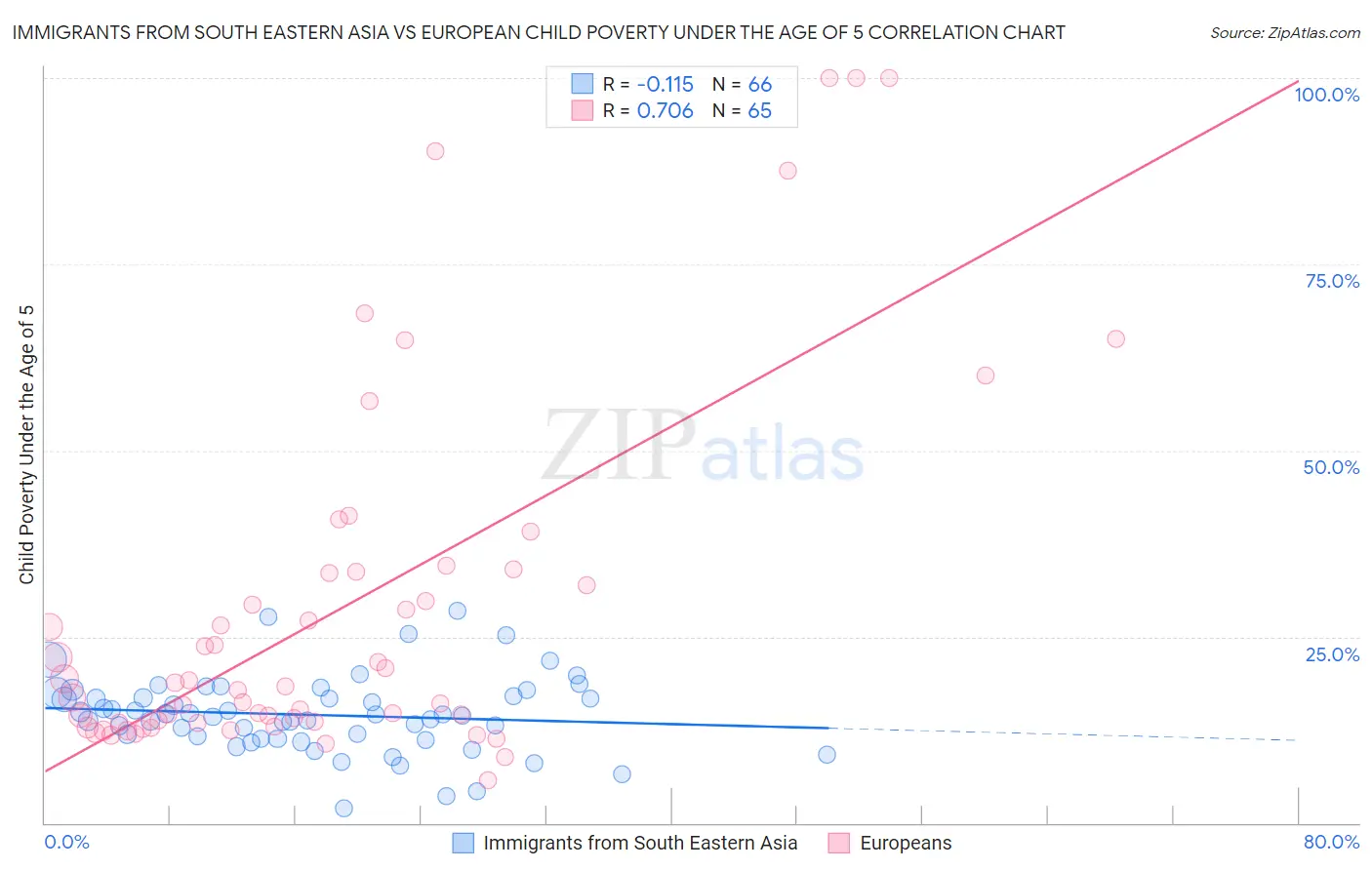Immigrants from South Eastern Asia vs European Child Poverty Under the Age of 5
COMPARE
Immigrants from South Eastern Asia
European
Child Poverty Under the Age of 5
Child Poverty Under the Age of 5 Comparison
Immigrants from South Eastern Asia
Europeans
15.7%
CHILD POVERTY UNDER THE AGE OF 5
97.1/ 100
METRIC RATING
94th/ 347
METRIC RANK
15.9%
CHILD POVERTY UNDER THE AGE OF 5
95.3/ 100
METRIC RATING
103rd/ 347
METRIC RANK
Immigrants from South Eastern Asia vs European Child Poverty Under the Age of 5 Correlation Chart
The statistical analysis conducted on geographies consisting of 484,854,990 people shows a poor negative correlation between the proportion of Immigrants from South Eastern Asia and poverty level among children under the age of 5 in the United States with a correlation coefficient (R) of -0.115 and weighted average of 15.7%. Similarly, the statistical analysis conducted on geographies consisting of 523,525,601 people shows a strong positive correlation between the proportion of Europeans and poverty level among children under the age of 5 in the United States with a correlation coefficient (R) of 0.706 and weighted average of 15.9%, a difference of 1.4%.

Child Poverty Under the Age of 5 Correlation Summary
| Measurement | Immigrants from South Eastern Asia | European |
| Minimum | 2.0% | 5.7% |
| Maximum | 28.5% | 100.0% |
| Range | 26.6% | 94.3% |
| Mean | 14.5% | 28.7% |
| Median | 14.5% | 18.3% |
| Interquartile 25% (IQ1) | 11.4% | 13.5% |
| Interquartile 75% (IQ3) | 17.0% | 33.6% |
| Interquartile Range (IQR) | 5.6% | 20.1% |
| Standard Deviation (Sample) | 5.1% | 24.2% |
| Standard Deviation (Population) | 5.1% | 24.0% |
Demographics Similar to Immigrants from South Eastern Asia and Europeans by Child Poverty Under the Age of 5
In terms of child poverty under the age of 5, the demographic groups most similar to Immigrants from South Eastern Asia are Ukrainian (15.7%, a difference of 0.020%), Scandinavian (15.7%, a difference of 0.040%), Polish (15.7%, a difference of 0.10%), Immigrants from Croatia (15.6%, a difference of 0.22%), and Immigrants from France (15.6%, a difference of 0.22%). Similarly, the demographic groups most similar to Europeans are Immigrants from North America (15.9%, a difference of 0.21%), Armenian (15.8%, a difference of 0.28%), Immigrants from Spain (15.9%, a difference of 0.28%), Tlingit-Haida (15.9%, a difference of 0.33%), and Immigrants from Zimbabwe (15.8%, a difference of 0.41%).
| Demographics | Rating | Rank | Child Poverty Under the Age of 5 |
| Jordanians | 97.3 /100 | #88 | Exceptional 15.6% |
| Immigrants | Croatia | 97.3 /100 | #89 | Exceptional 15.6% |
| Immigrants | France | 97.3 /100 | #90 | Exceptional 15.6% |
| Poles | 97.2 /100 | #91 | Exceptional 15.7% |
| Scandinavians | 97.1 /100 | #92 | Exceptional 15.7% |
| Ukrainians | 97.1 /100 | #93 | Exceptional 15.7% |
| Immigrants | South Eastern Asia | 97.1 /100 | #94 | Exceptional 15.7% |
| Immigrants | Switzerland | 96.4 /100 | #95 | Exceptional 15.8% |
| Immigrants | Kazakhstan | 96.2 /100 | #96 | Exceptional 15.8% |
| Macedonians | 96.2 /100 | #97 | Exceptional 15.8% |
| Immigrants | South Africa | 96.1 /100 | #98 | Exceptional 15.8% |
| Palestinians | 95.9 /100 | #99 | Exceptional 15.8% |
| Immigrants | Canada | 95.9 /100 | #100 | Exceptional 15.8% |
| Immigrants | Zimbabwe | 95.9 /100 | #101 | Exceptional 15.8% |
| Armenians | 95.7 /100 | #102 | Exceptional 15.8% |
| Europeans | 95.3 /100 | #103 | Exceptional 15.9% |
| Immigrants | North America | 94.9 /100 | #104 | Exceptional 15.9% |
| Immigrants | Spain | 94.8 /100 | #105 | Exceptional 15.9% |
| Tlingit-Haida | 94.7 /100 | #106 | Exceptional 15.9% |
| Slovenes | 94.4 /100 | #107 | Exceptional 16.0% |
| Immigrants | Brazil | 94.4 /100 | #108 | Exceptional 16.0% |